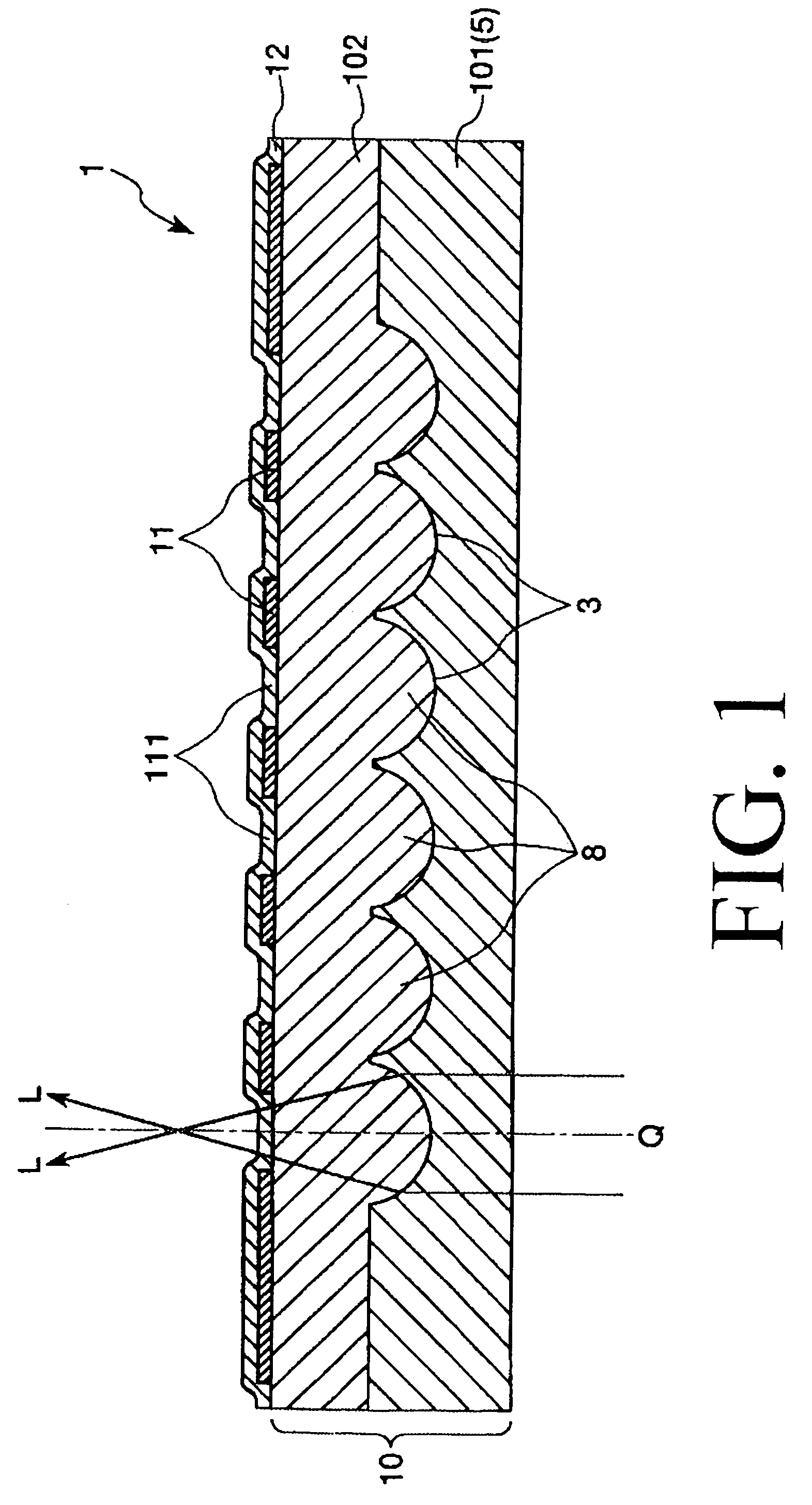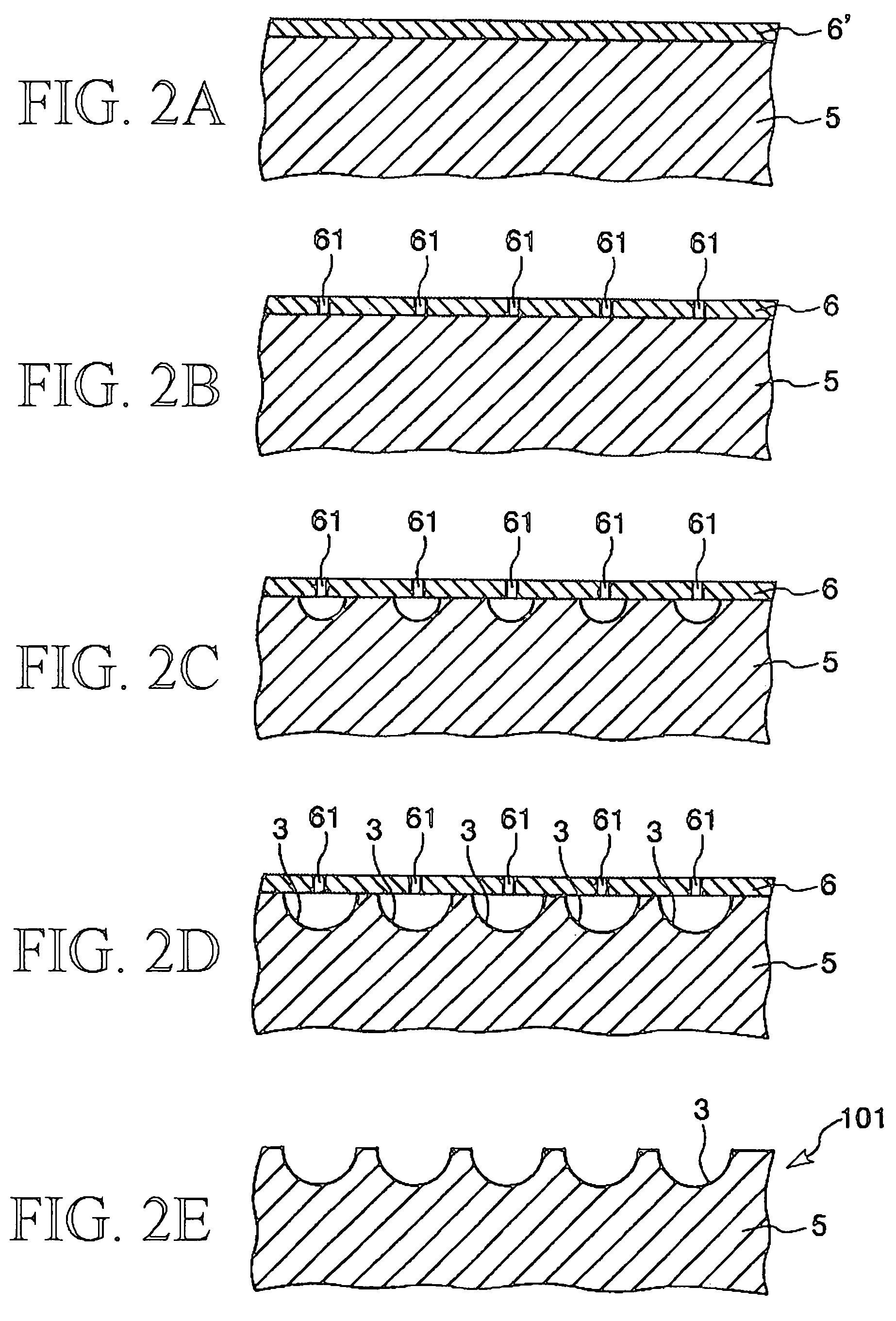Method of manufacturing a microlens substrate comprising pressure-joining a substrate to a base material in a state that the base material is heated while cooling the other major surface of the base material
a manufacturing method and technology of a microlens substrate, which are applied in the direction of glass tempering devices, instruments, manufacturing tools, etc., can solve the problems of complex manufacturing process, inability to obtain sufficient light resistance of a manufactured microlens substrate, and difficulty in obtaining a microlens substrate having sufficient durability in the case of using such a method. , to achieve the effect of excellent durability
- Summary
- Abstract
- Description
- Claims
- Application Information
AI Technical Summary
Benefits of technology
Problems solved by technology
Method used
Image
Examples
example
Example 1
[0161]A substrate with concave portions for microlenses equipped with a plurality of concave portions was manufactured, and then a microlens substrate was manufactured using the substrate with concave portions for microlenses in the following manner.
[0162]
[0163]First, a quartz glass substrate (which has a glass transformation point of 1060° C. and an index of refraction of 1.46) having a thickness of 2.0 mm was prepared as a glass substrate.
[0164]The quartz glass substrate was soaked in a cleaning liquid (that is, a mixture of 80% sulfuric acid solution and 20% hydrogen peroxide solution) heated to 85° C. to be washed, thereby cleaning its surface.
[0165]Next, Cr films each having a thickness of 0.03 μm were formed on the quartz glass substrate by means of a spattering method. Namely, a mask and a rear face protective film formed both of the Cr films were formed on the both major surfaces of the quartz glass substrate.
[0166]Next, a laser machining was carried out with respec...
example 2
[0178]A microlens substrate was manufactured using a substrate with concave portions obtained in the same manner as that in Example 1 described above as follows.
[0179]
[0180]A thin glass substrate (glass substrate) having a glass transformation point of 660° C. and an index of refraction of 1.61 was prepared. The thickness T1 of the glass substrate was 0.5 mm.
[0181]The glass substrate was mounted on the substrate with concave portions so as to face one major surface of the substrate with concave portions on which the concave portions were formed (see FIG. 3(a)).
[0182]Next, after reducing the ambient pressure to 5 Pa, the substrate with concave portions and the thin glass substrate were heated at 800° C. In this case, they were heated while cooling the major surface of the thin glass substrate opposite to the major surface thereof on which the substrate with concave portions was mounted.
[0183]Next, the thin glass substrate was pressure-joined to the substrate with concave portions, wh...
PUM
| Property | Measurement | Unit |
|---|---|---|
| thickness | aaaaa | aaaaa |
| thickness | aaaaa | aaaaa |
| depth | aaaaa | aaaaa |
Abstract
Description
Claims
Application Information
 Login to View More
Login to View More - R&D
- Intellectual Property
- Life Sciences
- Materials
- Tech Scout
- Unparalleled Data Quality
- Higher Quality Content
- 60% Fewer Hallucinations
Browse by: Latest US Patents, China's latest patents, Technical Efficacy Thesaurus, Application Domain, Technology Topic, Popular Technical Reports.
© 2025 PatSnap. All rights reserved.Legal|Privacy policy|Modern Slavery Act Transparency Statement|Sitemap|About US| Contact US: help@patsnap.com



